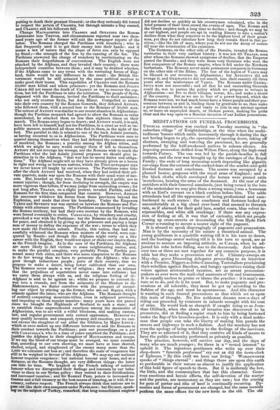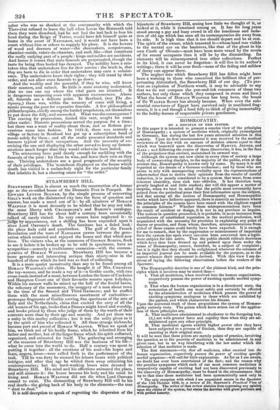MEDITATIONS ON FUNERAL PROCESSIONS. UNUSUAL, commotion was excited on Tuesday
morning in " the suburban village " of Knightsbridge, at the time when the multi- tudinous 'busses which rattle incessantly through it during the day not having begun to ply, the operations of opening doors, taking off shutters, sweeping and watering the pavement, &c. are generally performed by the half-awakened natives in solemn silence. An imposing procession defiled from Wilton Place, along the high-road towards Putney. The van was led by the parish-beadles in full uniform, and the rear was brought up by the carriages of the Royal Family ; the ends of long mourning-scarfs depending like gigantic ear-rings from the corners of the cocked-hats of the scarlet-and-gold liveried footmen and coachmen. The centre was occupied by a plumed hearse, gorgeous with the royal arms of England; and to the black cloths which enveloped the horses were pinned satin 'scutcheons, bearing the arms of the deceased. At the rear of the outriders with their funereal standards, (not being versed in the lore of the undertaker we may give them a wrong name,) was a horseman with an Earl's coronet on a black cushion before him. The sable attendants had all the appearance of being professional and case- hardened to such scenes : the coachmen and footmen looked up uncomfortably at a big cloud over-head that seemed to threaten rain, as if alarmed for their gold lace, scarlet coats, blue velvet in- expressibles, and white silk stockings : if there was any expres- sion of feeling at all, it was that of curiosity, which set people coming up cross-streets or descending the hill from Hyde Park Corner a-running to secure a nearer sight of the pageant.
It is absurd to speak disparagingly of pageants and processions. Man is by the necessity of his nature a theatrical animal. The young gentleman in a quadrille waiting till it is his turn to dance, and the hustings orator waiting till it is his turn to speak, are as anxious to assume an imposing attitude, as CzEsea, when he ad- justed his robe before falling, was to die decorously. And where- ever two or three are met together for any common purpose, it is odds but they make a procession out of it. Chimney-sweeps on May-day, grave Dissenting delegates proceeding to an interview with a Premier, Niggers a-John-Canoeing, Teetotallers proclaiming their rebellion against Bacchus, and hungry operatives raising their voices against aristocratical taxation, are as arrant procession- makers as ever were the mail-clad amateurs of tilt and tournament. It is equally useless to praise or blame the practice : it is man's na- ture so to do, and do it he must. But, to make pageants and pro- cessions at all tolerable, they must be got up according to the fashion of the age, and must be spontaneous. And this character is wanting in such funeral processions as that which set us upon this train of thought. No live nobleman dreams now-a-days of riding out preceded by retainers in tabards wrought with his coat of arms. He would look as sheepish if caught doing so as Jona- than Oldbuck, when the alarm of invasion was discovered to be premature, did at finding a rapier stuck to him by being buttoned under the flap of his breeches-pocket. It is only with a dead noble- man that people can take the liberty of making him parade the streets and highways in such a fashion. And the mockery has not even the apology of being soothing to the feelings of the survivors. They are so ashamed of it, that they contrive all kinds of means to have the public solemnity performed as privately as possible.
The practice, however, will survive our day, and the days of many who are much younger ; for there is a " vested interest" to uphold it. The ingenious gentlemen who write up over their
shop-doors " funerals performed" cry out as did the town-clerk of Ephesus, " By this craft we have our living." Wonnswowrit
speaks of " things eternal" : and things there are upon this earth so perdurable in their nature as almost to justify the application of this bold figure of speech to them. But it is uniformly the low, the little, and the commonplace that has this character. Gene- rous emotions and heroic efforts, the self-devotion of the martyr and the patriot, are momentary as they are rare ; but the craving
for pots of porter and ribs of beef is continually recurring. Dy- nasties and forms of government are changed, but the same menials perform the same offices for the new lords as the old. The old
usher who was so shocked at the contumacity with which the Tiers-etat refused to leave the hall when Louis the Sixteenth told them they were dissolved, had he not had the bad luck to lose his head dunng the Reign of Terror, would have felt himself quite at home in the court of NAPOLEON, and it would not have been a court without him or others to suppply his place. It is the hewers of wood and drawers of water—the shoemakers, sempstresses, chamber-maids, valets-de-chambre, and such like—that constitute the really undying part of a people : kings and nobles are accidents. And hence it comes that state funerals are perpetuated, though the taste for being thus buried has decayed. The nobility have a mis- taken idea that undertakers live for their service : the truth is, that they are born to die in order that undertakers may earn a subsist- ence. The undertakers know their rights : they will stand by their order, and not allow state funerals to go down. And the wealthy and the powerful, if they be wise, will know their masters, and submit. So little is state anatomy understood, that no one can say where the vital parts are situated. It is dangerous tampering even with apparent excrescences. Above all, funerals are a delicate point. In Scotland, (see The An- tiquary,) there was, within the memory of some still living, a mania among the poor for expensive funerals. A few philosophical philanthropists, chiefly among the landed proprietors, set themselves to put down the folly, and succeeded. What was the consequence ? The craving for processions, denied this vent, sought for some other outlet : Masonic processions served the purpose for a time; but there was a want of reality about them, and so Reform pro- cessions came into fashion. In 1831-2, there was scarcely a village or factory in Scotland but got up a subscription band of music solely for them ; and all the crafts procured standards and banners typical of their occupations. And the necessity of ex- ercising the one and displaying the other served to keep up demon- strations much longer than they would otherwise have lasted. The aristocracy have paid dearly enough for meddling with the funerals of the poor : let them be wise, and leave their own as they are. Thriving undertakers are a good prognostic of the security of their privileges. The 'scutcheon displayed on the house which death has visited is a melancholy sight for the particular family that inhabits it, but a cheering omen for " the order."



























 Previous page
Previous page